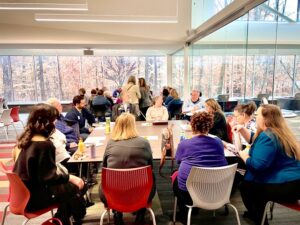On a warm October afternoon, David Allgood, 58, drove his power wheelchair down a Louisville sidewalk, spotting uneven surfaces and inaccessible curb cuts that pose dangers to people operating a wheelchair or walking with a cane.
Allgood’s trip around town that day wasn’t personal but rather, a part of an outdoor audit that supports Age-Friendly Louisville, a city-wide coalition created in 2016 that is based on a World Health Organization model that aims to make communities and cities better suited for all ages and life stages.
“This WHO program has really aided the health of those in Louisville by encouraging a dialogue and network of partnerships between community groups, city services and small businesses that often operated separately in the past,” said Allgood, a person with quadraplegia since he was 16. Allgood, who is director of advocacy for the Center for Accessible Living, a non-profit disabilities rights and resources center, added: “Now many more groups are working together to make the city safer for everyone and to get services to people that need it most.”
“This WHO program has really aided the health of those in Louisville by encouraging a dialogue and network of partnerships between community groups, city services and small businesses that often operated separately in the past.”
Recent data has shown that residents living in age-friendly communities report they have better health in comparison to those who don’t live in such communities. Louisville is one of six age-friendly communities in Kentucky, and one of more than 700 throughout the U.S. Other Kentucky community Age-Friendly members include Bowling Green, Daviess County, Lexington, Owensboro and Woodford County. These communities have embraced the WHO age-friendly model in conjunction with the seniors group AARP, WHO’s affiliate in the U.S.
 As a WHO affiliate, AARP launched its Network of Age-Friendly Communities in 2012 to work with local, regional and state governments and partner organizations on making communities more livable for people of all ages, especially older adults. WHO keys to age-friendly communities include built environments (such as buildings, streets, sidewalks, transportation networks, community facilities, public spaces) that are accessible and safe for children and older adults with varying needs and abilities.
As a WHO affiliate, AARP launched its Network of Age-Friendly Communities in 2012 to work with local, regional and state governments and partner organizations on making communities more livable for people of all ages, especially older adults. WHO keys to age-friendly communities include built environments (such as buildings, streets, sidewalks, transportation networks, community facilities, public spaces) that are accessible and safe for children and older adults with varying needs and abilities.
Allgood’s October 2024 audit of the sidewalks and roads will be used as part of Age-Friendly recommendations to Louisville city officials targeting areas for infrastructure safety improvements, like fixed potholes, improved crosswalks and longer signal crossing times.
“We want to ensure that all citizens, regardless of their disabilities or abilities, have an opportunity for full inclusion in our community so that they can get out and do what everyone else does,” said Allgood.
To name a few more of the benefits to Louisville since it joined the age-friendly program in 2016: a larger pool of home builders with certification to remodel homes for aging-in-place and access to a network for finding them, a resource guide for older adults who may need 24/7 home repair services or other home help; training for public service employers [i.e. police, fire fighters, emergency responders] to respond to unique health situations arising among older adults and those living with disabilities; health provider training in alternative pain management options to combat the opioid epidemic and inter-generational neighborhood parades and social events to reduce loneliness and build community cohesiveness.
“Being part of the WHO age-friendly program has helped keep our focus on providing age-friendly community services to Louisville and provided a network to get it done,” says Sarah Teeters, manager of advocacy and outreach for Louisville Metro Government. Other partners in the city’s Age-Friendly program include University of Louisville Trager Institute, the Kentuckiana Regional Planning & Development Agency.
Since the program began in 2016, Age-Friendly Louisville has held hundreds of events, and reached tens of thousands of city residents, says Teeters. For example, between July 2023 and July 2024, Louisville Metro hosted 250 events, attended by 81,000 residents who received Age-Friendly resources, she said.
